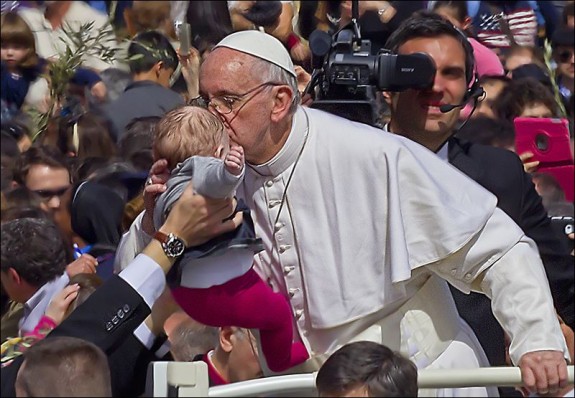The paper sniffs around for some analysis of the pope’s interview:
Francis is challenging the status quo of the Roman Catholic Church so determinedly and so unexpectedly that Vatican watchers are debating whether this is merely a change of tone, as many had thought at first. Some now think the pope may be making a deliberate effort to shake up the Vatican governing hierarchy, known as the Curia, and prepare the ground for a more fundamental shift in the direction of the church.
“I think we are looking at major changes,” said John Thavis, a longtime Vatican observer and author of “The Vatican Diaries.” “There is a lot of disorientation inside the Roman Curia. They used to feel they were in charge. Right now, they know they are not in charge.”
The latest unexpected jolt from Pope Francis came in an interview conducted with a Jesuit journalist and released Thursday in Jesuit publications around the world. Francis, himself a Jesuit, chastised the church’s narrow focus on controversial social issues and called instead for a more merciful and less judgmental church. He had already sent out earlier signals, declining to live in the papal apartments in the Apostolic Palace, chiding prelates for driving fancy cars and announcing that church properties should be used as shelters for refugees.
Francis did try to temper the impact of his remarks on Friday, telling an audience of Catholic gynecologists that abortion was a symptom of our “throwaway culture” and urging them to refuse to perform the procedure.
But there seems little question that Francis wants to change the papal conversation. His predecessor, Benedict XVI, often seemed engaged in an angry verbal jousting match with secularism and modernity, usually delivered through formal encyclicals or speeches that, to many Catholics, felt like a personal rebuke. The church seemed like “a rigid institution dictating impossible norms to follow, an overly severe mother,” said Lucetta Scaraffia, a scholar of Catholicism in Rome.
By contrast, Pope Francis has made impromptu telephone calls to people who have written him letters seeking help, while also thriving on socializing with other priests and laypeople. He is assuming the tone of the parish priest, many analysts say, recognizing that people struggle daily with issues of conscience and that the church, rather than shake a finger, must offer a broader message of comfort and healing. Many analysts have seized on an analogy cited by Francis in his interview: the church as a hospital in a battlefield.
“People have been wounded in a war over secularization,” said Ms. Scaraffia, a history professor at the University of Rome La Sapienza. “He’s saying: ‘Let’s look after the wounds. That’s more important than winning the war.’ ”











